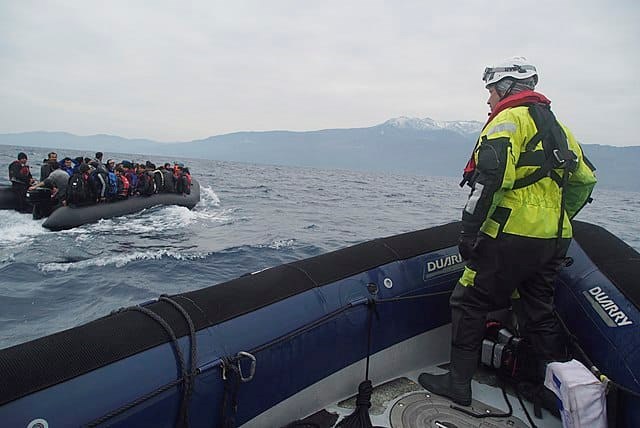Greek Reporter
By Jonita Simmons
Wednesday October 12, 2022

Refugees crossing the Mediterranean sea on a boat heading from the Turkish coast to the northeastern Greek island of Lesbos on January 29, 2016. Credit: Mstyslav Chernov/Unframe.CC–BY-SA-4.0 / Wikimedia Commons
Four NGOs stand charged with smuggling illegal immigrants
from Turkey to Greece in the summer of 2021. The NGOs, both well-known and
reputable, allegedly colluded with traffickers working from the Turkish coast.
They have also been accused of spying on the Hellenic Coast Guard.
The groups face charges based on information provided by an
undercover sting operation led by the Greek National Intelligence Service
(EYP). Two foreign nationals evidently posed as would-be refugees to Greece
after traveling to Turkey. Once there, they apparently requested transportation
on one of the numerous migrant boats that smuggle migrants from the Turkish
Riviera to the Greek islands such as Lesvos.
The incident highlights the constant struggle of Greek
authorities to stem undocumented migrants from entering the country.
It also comes at a time when Athens is under increasing
international pressure to stop alleged illegal pushbacks.
Greece has been accused of migrant pushbacks by several NGOs
and foreign media, allegations that Athens has been denying.
In July, a joint investigation by the Guardian, Lighthouse
Reports, Le Monde, Der Spiegel, and ARD Report München alleged that several
undocumented migrants who had recently crossed into Greece from Turkey through
Evros River were used as boatmen to ferry other migrants back to Turkey.
In February 2022, the United Nations Refugee Agency (UNHCR)
called for Greece to stop pushing back migrants attempting to seek asylum in
the country.
U.N. High Commissioner for Refugees Filippo Grandi spoke out
against “the increasing number of incidents of violence and serious human
rights violations against refugees and migrants at various European borders”
that have led to multiple deaths. Grandi also called out Greece directly.
Human trafficking to
Greece
This is not the first incident the Hellenic Coast Guard has
brought to light. In September of this year, police arrested two hotel owners
on Rhodes for their involvement in the smuggling of illegal migrants from
Turkey to Greece.
Furthermore, in July, a large international criminal
organization responsible for helping undocumented refugees into the country was
dismantled by the Greek authorities. Indeed, in total, Greece has stopped
almost 160,000 undocumented migrants from entering the country this year.
The problem, in fact, is endemic in Greece today. It has
been since the migrant crisis in the Aegean exploded in 2015. The current sting
operation took place in August of this year. Its code name was Alcmene after
the mother of a mythological hero in Greece and the demigod Hercules.
According to EYP, the NGOs, which were allegedly providing
humanitarian services, used the Alarm Phone app for the purpose of smuggling.
The Alarm Phone app is an emergency channel often used by migrants who find
themselves in distress while crossing the Mediterranean.
Critics, however, were quick to point out that it is in
essence a tool for those who want the coast guard to pick them up in order to
enter European countries more easily. This is especially so because if that
call is ignored, then NGOs and the Alarm Phone app use social media to apply
pressure on the government.
Smugglers from
Western Europe
The alleged human smugglers come from Western Europe. The
EYP has identified them as Swiss, French, Austrian, German, Norwegian, and
Bulgarian. Two other groups were based in Berlin.
According to a report published on Monday, the EYP named
thirty-five members of four different NGOs who coordinated with traffickers
from Turkey on the departure and arrival of illegal immigrants and unregistered
asylum seekers to the Greek isles using “illegal methods and procedures.”
The investigation was launched when the Port Authority of
Kos was notified of a dinghy entering the port with no sign of migrants on the
boat although the coast guard and police later identified them.
Afterwards, the authorities received an email containing the
names of the refugees that came from a lawyer who was the head of an NGO. The
coordinator of the trafficking was a Turkish coast guard. The NGOs allegedly
received the lists in order to prevent deportation.
Lesvos is one of the islands that has seen a majority of the
flood of migrants. Most came from war-torn Syria and Iran after fleeing to
Turkey. Nonetheless, many also came from as far away as Congo, Somalia,
Afghanistan, and Burma.
The northern borders were another hot spot prior to the
government and other neighbor states sealing them off. The case against the
NGOs is unique, nonetheless, although, in 2020, on Lesvos, the government
charged another group from central and northern Europe with trafficking. The
group was forced to stop their activity and leave Greece.